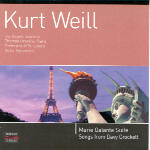The musical fragments featured on this CD resulted from projects Kurt Weill undertook between 1934 and 1937, the time he left France and settled in America. The Marie Galante music was written for a production based on Jacques Deval’s play, which concerns the trials and tribulations of a French prostitute who finds herself stranded in Panama. The music sounds like bottom-drawer Berlin-period Weill–not very memorable, but then Deval’s texts are not the sort to provide much inspiration. The Davy Crockett songs, performed here with piano, were for an abandoned project of the Columbia University Players that was to have starred Henry Fonda. Though Weill expressed enthusiasm at being able to embrace American ideals and ideas, the music is not close to his best. Only the final soprano song, “Time is standing still”, makes any impression. The orchestra and pianist Thomas Hrynkiw perform this music with idiomatic flair, but soprano Joy Bogen is distressing. She has the somewhat hooty, uneven, cold and characterless quality that pervades much of the work exhibited by today’s American sopranos. The recorded sound is fine, but this CD will appeal only to Weill fanatics, those who must have every note the composer ever wrote, good or bad.
































